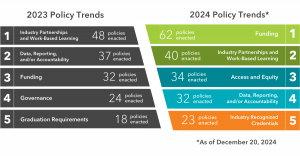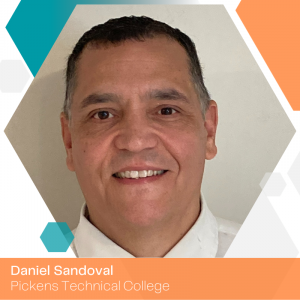In December 2024, the Association of Career and Technical Education (ACTE) hosted its annual VISION conference in San Antonio, Texas, where Career Technical Education (CTE) administrators and practitioners gathered to network and share innovative approaches to implementing CTE nationwide. During the conference, Advance CTE and ACTE provided updates on their CTE policy-tracking efforts, highlighting 2024 CTE policy examples, trends, and popular categories.
As of December 2024, Advance CTE and ACTE have tracked 159 policies implemented across 40 states. Making a comeback as the 3rd most popular category in 2024 after falling out of the top five in 2023, Access and Equity garnered 34 policies in 2024. This resurgence demonstrates that states are increasingly prioritizing making CTE programs more accessible and equitable for all learners.

Enacted this year, the following policies reflect initiatives that make CTE more accessible and equitable specifically for underserved populations-
Idaho: Increasing Postsecondary Access to Economically Disadvantaged Learners
Idaho HB 500 established the Idaho Opportunity Scholarship to incentivize economically disadvantaged learners to complete a degree or certificate by increasing their access to postsecondary education. To qualify for this scholarship, learners must apply for federal student financial assistance and meet certain criteria to be established by the state board. The state board is required to publicize rules to determine student eligibility, academic and financial eligibility, a process for eligible students to apply, amount of awards, how eligible students will be selected when the awards shall be made, and other rules necessary for the administration of the scholarship.
Oregon: Creating Funding Mechanisms to Support Underserved Learners
Oregon S.B 1532 required the state Department of Education to create and implement a statewide plan to support “plan students,” who are defined as asylum seekers, refugees, or any other immigrants, and learners who have experienced disproportionate results in education due to historical practices. The plan must provide strategies to increase the attendance and engagement of “plan students” in educational activities. The law required the Department of Education to award grants to institutions such as early learning hubs, school districts, postsecondary institutions, tribal governments, and select community-based organizations for the implementation of the plan. Funding for these grants comes from the Department of Education Statewide Education Initiatives Account.
New Mexico: Offering Stipends to Reduce Financial Burdens for Learners
New Mexico H.B. 303 created a Workforce Training Economic Support Pilot Program to identify workforce training programs in priority industries, increase access to living-wage jobs in these industries, and increase financial stability for New Mexico residents. The three-year pilot program will offer economic support in the form of monetary stipends to cover the costs associated with basic living needs including housing, food, and transportation, and the costs associated with enrolling in and attending a workforce training program. Through the approved workforce training program identified in the pilot program, participants will acquire skills that will result in a certification, license, or credential for relevant industry employment.
 To see more policy trends and access our policy tracker, check out the Advance CTE State Policy Resources page.
To see more policy trends and access our policy tracker, check out the Advance CTE State Policy Resources page.
Velie Sando, Policy Associate


 Tell me more about your journey to the Fellowship.
Tell me more about your journey to the Fellowship.